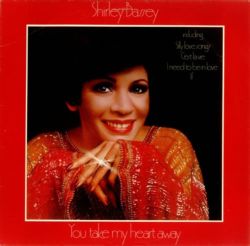| You Take My Heart Away | ||||
|---|---|---|---|---|
 | ||||
| Studio album by | ||||
| Released | 1977 | |||
| Genre | Vocal / MOR | |||
| Label | United Artists | |||
| Producer | Martin Davis | |||
| Shirley Bassey chronology | ||||
| ||||
You Take My Heart Away is the 22nd studio album from Shirley Bassey, released in 1977 on the United Artists Records label. The album peaked at #34 in the UK album chart. [1] The tracks recorded for this album are contemporary pop, soft rock songs, dating mainly from the early to mid-1970s. The title track "You Take My Heart Away", originally performed by Bill Conti, was featured in the 1976 film Rocky . Other covers versions included are: "This One's for You" from Barry Manilow, "Silly Love Songs" from Wings, which had been a #1 hit single on the Billboard Hot 100, "Stargazer" from Neil Diamond. Only one track dates from a previous era: "Can't Help Falling in Love" was recorded by Elvis Presley in 1962.
Contents
Two singles were issued from the album "I Let You Let Me Down Again" which featured "Razzle Dazzle", a non-album track, on the B-side. The second single, issued in the wake of the success of the Rocky movie, was "You Take my Heart Away" with "I Let You Let Me Down Again" issued as the B-side. You Take My Heart Away was issued originally on 33.3rpm vinyl and audio cassette with a sleeve cover photography by Ray Massey. The album was re-issued on a double CD set in 2006, by BGO Records, together with the 1978 album Yesterdays. [2]